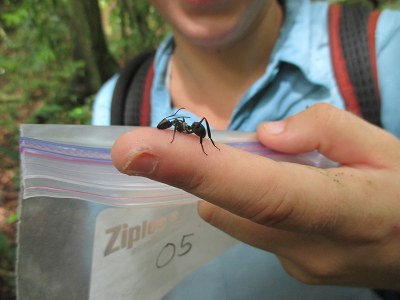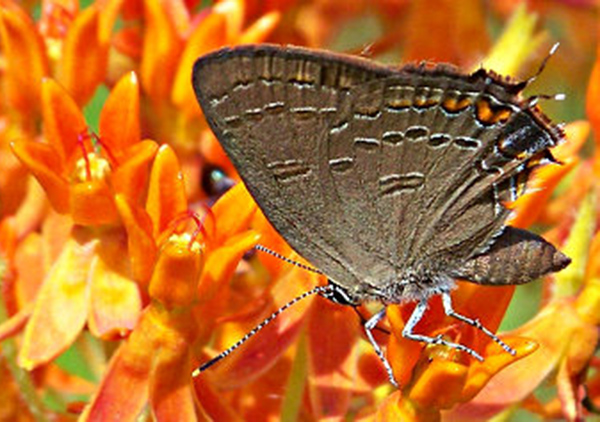Out of the lab and into the forest
Senior Katie Arstingstall spent the summer studying tropical rainforest ecology on Barro Colorado Island, Panama.
When senior Katie Arstingstall walks out of the biology lab on Belknap campus, she is surrounded by the classrooms, cars and concrete of UofL’s urban environment. But this past summer, when she stepped out of the lab in Panama, she was greeted by Howler monkeys, agoutis, poison dart frogs, and the cacophony of life within a tropical rainforest.
On Barro Colorado Island, Arstingstall was fully immersed in the scientific study of the tropical rainforest. From collecting data on ants in the field to analyzing that data in modern, spacious laboratories on the island, she worked alongside other undergraduate researchers, as well as graduate, Ph.D., post-docs, and principal investigators. Researchers from France, Germany, the United Kingdom, and the United States, among other places, converged on the island to study the rainforest teeming with biological diversity and share their knowledge, broaden their personal and professional horizons, and find other ways of viewing the world.
“On one of my last days on the island, I went on a long hike with two of my good friends,” Arstingstall said. “Each of us knew things about the forest and its inhabitants that the other two did not, and we could share this knowledge with each other. We were even able to collect a few specimens for our work.
“I think that is what studying on Barro Colorado is all about: meeting driven people that share in this pure love for the environment and want to learn as much as they can,” she said. “On Barro Colorado Island, you become so much closer with nature. Work, learning, and leisure are all rolled into one, and that is a beautiful thing.”

A tropical canopy ant, the subject of senior Katie Arstingstall’s research project on the thermal adhesion of canopy ants on Barro Colorado Island.
Arstingstall, a biology major, spent the summer researching thermal adhesion of canopy ants, or how well different species of canopy ants can stick to a vertical surface at a range of temperatures, on Barro Colorado Island. Working in Prof. Steve Yanoviak’s (Biology) lab during the school year, she assisted post-doc Alyssa Stark with her research on ants, and was subsequently invited to continue the project on the island, as well as develop a project of her own.
Drawn to the study of ecology after following Prof. Yanoviak’s career, Arstingstall plans to further her education in graduate school, concentrating on ecology.
“In the modern, industrialized world that we live in today, ecological research is of the utmost importance,” she said. “We must learn to coincide with nature, rather than removing ourselves from it further. I study ecology because I want to help the world become more sustainable, and I want to encourage people to care about the environment.”
I was researching thermal adhesion of canopy ants on Barro Colorado. In other words, how well different species of canopy ants can stick to a vertical surface at a range of temperatures. I have been working in the Yanoviak lab for about 6 months now. I met Steve as the professor of my Conservation Biology class last fall. I have always been very intrigued by Steve’s career as an ecologist, and I wanted to be a part of it. I started out in the lab, as most do, doing the busy work for a PhD student’s project. After a few weeks, Alyssa Stark, Steve’s post-doc, asked me if I wanted to help her with her ant adhesion project. She had started a very similar project to mine the previous summer on Barro Colorado. She wanted to expand it to include ants in temperate environments. I worked on this project with her until the end of the summer, when Steve and Alyssa asked me if I wanted to go to the island to continue this project along with a new one of my own. Of course, I graciously accepted.
My experience was phenomenal. Greater than I had ever anticipated. Barro Colorado is a world within itself. On my first long hike in the forest I saw toucans, howler monkeys, agoutis, poison dart frogs and all kinds of wonderful insects. The island is very active and has so much diversity; I saw something new every time I went out into the field. I met so many wonderful people from all over the world (Germany, the U.K., the Netherlands, France) that were all doing amazing work and were very passionate about what they do. I had so many informative conversations that broadened my horizons and allowed me to look at things differently. The resources and facilities on the island were great. The labs were spacious, but consolidated at the same time. They were air conditioned and comfortable, which was very nice after being in the field all day. One minute, I would be collecting ant in the forest, and fifteen minutes later I could be in the lab gathering data on what I had just collected. It was a researcher’s dream. It was mainly graduate and PhD students on the island, but older, more experienced post-doc’s and PIs (Principal Investigators) often visited as well. Two of my close friends’ supervisors were there for a few weeks, and I learned at lot from them. One of my favorite things about staying on the island was freedom I had (and the responsibility that came with it). No one was telling me what to do or when to do it (except for Alyssa's guidance during our skype calls and emails). It made me very confident in my abilities as a researcher.
On one of my last days on the island, I went on a long hike with two of my good friends. All along the 3 hour hike, we stopped to look at things that interested us. Each of us knew things about the forest and its inhabitants that the other two did not, and we could share this knowledge with each other. We were even able to collect a few specimens for our work. At the end of the hike, the forest opened up and we were on the edge of the Panama Canal. We sat there for about an hour admiring the view. There was a crocodile swimming by and monkeys playing in the trees of a nearby peninsula. I think that is what studying on Barro Colorado is all about: meeting driven people that share in this pure love for the environment and want to learn as much as they can. On Barro Colorado Island, you can become so much closer with nature. Work, learning, and leisure are all rolled into one, and this is a beautiful thing.
I have loved animals and spending time outside since I was a child, but my high school biology teacher sparked my interest in studying the natural world. During his lectures, you could tell that he was very passionate about what he was teaching, and he wanted us to have that same passion. This, along with the awesomeness of nature in general, inspired me to become a biologist. I chose ecology as the concentration for my biology degree because I couldn’t see myself studying anything else. In the modern, industrialized world that we live in today, ecological research is of utmost importance. If we, as humans, want to continue to inhabit this planet, we must learn to coincide with nature, rather than removing ourselves from it further. I study ecology because I want to help the world become more sustainable, and I want to encourage people to care about the environment and the wellbeing/ future of our planet.
My plans for the future are a little foggy still, but I tentatively plan to get my MS and PhD in either ecology or environmental science. Right now, I am seeing where each new opportunity takes me and what doors they open up!

